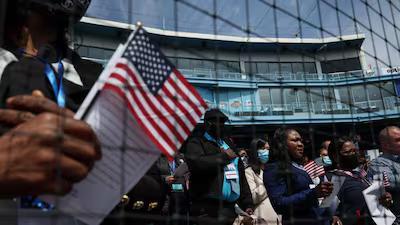
Immigrants Seeking US Citizenship to Undergo Neighborhood Checks
In a move aimed at strengthening the vetting process for immigrants seeking US citizenship, the Trump administration has announced plans to revive a practice that was last used in the 1990s – neighborhood checks. According to a recent report, officials will conduct interviews with neighbors, coworkers, and employers to assess applicants’ character and loyalty, as part of the application process for naturalization.
The decision to reinstate neighborhood checks is seen as a bid to ensure that applicants meet the citizenship criteria, including good moral character and adherence to the US Constitution. The move comes as part of a broader effort by the Trump administration to improve the vetting process for immigrants, amidst concerns over national security and public safety.
Under the new policy, immigration officials will conduct background checks and gather information from a range of sources, including personal references, employers, and neighbors. This information will be used to assess an applicant’s character, reputation, and overall suitability for citizenship.
The decision to revive neighborhood checks has sparked debate among immigration experts and advocates, with some welcoming the move as a necessary measure to ensure public safety and national security, while others have raised concerns about the potential for discrimination and bias in the process.
A Nostalgic Practice with a Modern Twist
Neighborhood checks were previously used by the US immigration authorities in the 1980s and 1990s, as part of a broader effort to vet applicants for naturalization. However, the practice was discontinued in the early 2000s, following concerns over its effectiveness and potential for bias.
In recent years, the Trump administration has sought to revive the practice, citing concerns over national security and public safety. According to immigration officials, the new policy is designed to provide a more comprehensive assessment of an applicant’s character and loyalty, by gathering information from a range of sources, including personal references, employers, and neighbors.
Under the new policy, immigration officials will conduct interviews with applicants, as part of the naturalization process. These interviews will focus on assessing an applicant’s character, reputation, and overall suitability for citizenship. The information gathered during these interviews will be used to determine whether an applicant meets the citizenship criteria, including good moral character and adherence to the US Constitution.
Critics Raise Concerns over Bias and Discrimination
While the Trump administration has defended the new policy as a necessary measure to ensure public safety and national security, critics have raised concerns over the potential for bias and discrimination in the process. According to immigration advocates, the policy could disproportionately affect certain communities, including minority groups and individuals from low-income backgrounds.
Critics have also raised concerns over the potential for information gathered during neighborhood checks to be used to discriminate against applicants, based on their race, religion, or national origin. In a statement, the American Civil Liberties Union (ACLU) expressed concerns over the policy, saying that it “could lead to the targeting of communities of color and other marginalized groups.”
A Step Forward in Strengthening National Security
Despite concerns over bias and discrimination, the Trump administration has defended the new policy as a necessary measure to strengthen national security. According to immigration officials, the policy is designed to provide a more comprehensive assessment of an applicant’s character and loyalty, by gathering information from a range of sources, including personal references, employers, and neighbors.
In a statement, a spokesperson for the Department of Homeland Security (DHS) said that the new policy was designed to “ensure that those seeking to become American citizens meet the highest standards of character and loyalty.” The spokesperson added that the policy would help to “identify and prevent potential security threats” and “protect the United States from terrorism and other national security threats.”
Conclusion
The Trump administration’s decision to revive neighborhood checks for immigrants seeking US citizenship has sparked debate among immigration experts and advocates, with some welcoming the move as a necessary measure to ensure public safety and national security, while others have raised concerns over the potential for bias and discrimination in the process.
While the policy has been defended as a necessary measure to strengthen national security, critics have raised concerns over the potential for information gathered during neighborhood checks to be used to discriminate against applicants, based on their race, religion, or national origin. As the debate continues, it remains to be seen whether the new policy will ultimately improve the vetting process for immigrants, or whether it will lead to a more divided and polarized society.
Source:



